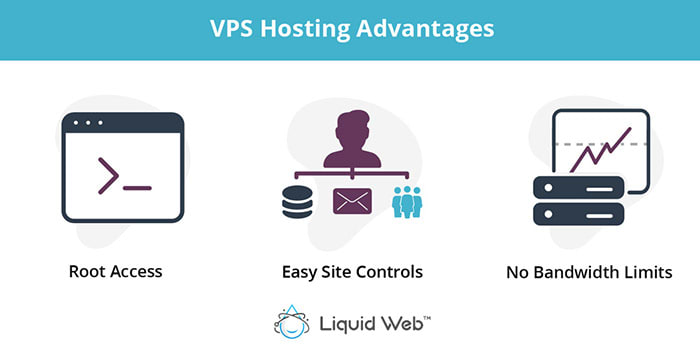The middle tier of hosting options provided by Liquid Web are VPS packages (Virtual Private Server). VPS packages are designed for sites with low to medium traffic, small web hosts or designers with a small number of websites, or as a staging or development environment for testing a new application.

VPS Hosting Advantages
VPS customers have root access and the flexibility to configure the server to meet their needs. VPS customers can manage all aspects of the sites they control, including email, DNS, databases, users, and more.
Third-party applications, libraries and modules that require root level access can be set up and configured. Third-party software is not covered under Liquid Web’s fully managed support. Installing and troubleshooting unsupported software falls under Liquid Web’s “Beyond Scope Support” support.
Upgrading to Dedicated
We understand that choosing the right server is an important decision. With Liquid Web, the Cloud Server platform makes it effortless to upgrade by scaling it into a Dedicated Server. Before making the decision to switch to a dedicated server, make sure you understand the difference between VPS and Dedicated.
If you are already an existing Liquid Web customer and have a VPS hosting with us, making the switch to a Dedicated Server is simple. To do so, simply sign in to your Manage Liquid Web account, click on the + symbol next to your server name, and then click the Resize button that appears near the top of the interface. You will be given a list of all available Cloud Server plans and options, and once you make your decisions the Cloud Server platform will take care of everything else. You will not have to migrate your data, and as long as you are staying within the same virtual server zone you will not have to change IP addresses.
Options
Depending on the server choice you make you may be presented with the option to perform a Quick resize or a Full resize. Quick resizes are ideal for customers who are experiencing a sudden traffic influx and need improved server resources as quickly as possible, but you will only receive the additional CPU and RAM allocations. If you choose a Quick resize you will need to come back and complete the Full resize later to receive your additional storage space. Full resizes will give you access to CPU, RAM, and storage upgrades, but full resizes take longer to complete due to the change in physical storage devices.
It is incredibly difficult to estimate how long a specific resize for a specific server will take, which is why we recommend full server resizes be performed when your site(s) are not experiencing peak visitor activity.
Whenever you are making a switch to a new server or are looking to keep your data secure, ensure that you have properly upgraded your server for optimal security assurance.
Care to Join Us?
We pride ourselves on being The Most Helpful Humans In Hosting™!
Our Support Teams are filled with experienced Linux technicians and talented system administrators who have intimate knowledge of multiple web hosting technologies, especially those discussed in this article.
Should you have any questions regarding this information, we are always available to answer any inquiries with issues related to this article, 24 hours a day, 7 days a week 365 days a year.
If you are a Fully Managed VPS server, Cloud Dedicated, VMWare Private Cloud, Private Parent server, Managed Cloud Servers, or a Dedicated server owner and you are uncomfortable with performing any of the steps outlined, we can be reached via phone @800.580.4985, a chat or support ticket to assisting you with this process.
Related Articles:

About the Author: Jay Allen
Our Sales and Support teams are available 24 hours by phone or e-mail to assist.
Latest Articles
Managed Server vs. Unmanaged Server Defined
Read ArticleChange cPanel password from WebHost Manager (WHM)
Read ArticleChange cPanel password from WebHost Manager (WHM)
Read ArticleChange cPanel password from WebHost Manager (WHM)
Read ArticleChange the root password in WebHost Manager (WHM)
Read Article


